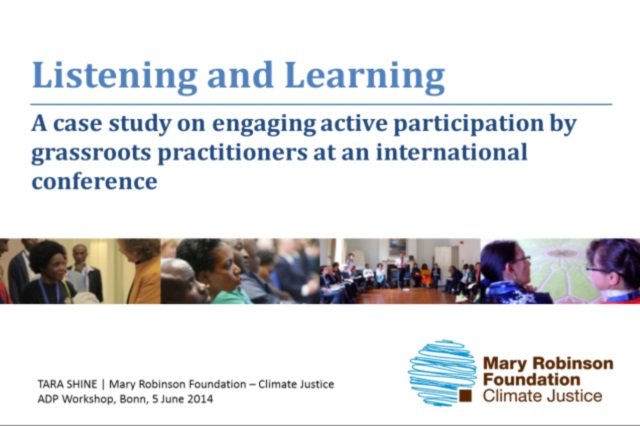The Foundation’s Head of Research and Development Tara Shine presented on the topic of participation as it relates to Article 6 of the United Nations Framework Convention on Climate Change (UNFCCC).
The Mary Robinson Foundation – Climate Justice was represented at the June 2014 session of climate change negotiations in Bonn when the Foundation’s Head of Research and Development Tara Shine presented on the topic of participation as it relates to Article 6 of the United Nations Framework Convention on Climate Change (UNFCCC).
Dr Shine’s presentation, ‘Listening and Learning: A case study on engaging active participation by grassroots practitioners at an international conference,’ was delivered to delegates on the second day of the latest round of negotiations, which take place from 4 – 15 June 2014.
In her presentation, Dr Shine referred to one of the Principles of Climate Justice: ‘Ensure that Decisions on Climate Change are Participatory, Transparent and Accountable,’ which highlights the importance that the voices of the people most vulnerable to climate change are heard and acted upon. The principle acknowledges how the opportunity to participate in decision-making processes which are fair, accountable, open and corruption-free is essential to climate justice.
Following the presentation, a short film was shown which depicted the Hunger • Nutrition • Climate Justice Conference, held in April 2013 and co-hosted by the Foundation and the Government of Ireland. The conference brought global policy makers together with the people their decisions impact the most – representatives of grassroots communities across the world.
Article 6 of the UNFCCC refers to education, training and public awareness in relation to climate change negotiations, stating that Parties to the Convention shall promote and facilitate “Public participation in addressing climate change and its effects and developing adequate responses”.
Hunger • Nutrition • Climate Justice showed how participation can make a difference in bringing about effective solutions to the climate change crisis, while highlighting the devastating human rights impacts which can result from the unpredictable weather shocks caused by climate change – rights such as the right to food, shelter, health, and life. By placing people at the centre, the clearest picture of the crisis facing the world’s most vulnerable emerges.
The June session in Bonn encompasses the fortieth sessions of the Subsidiary Body for Implementation and the Subsidiary Body for Scientific and Technological Advice, as well as the resumed second session of the Ad Hoc Working Group on the Durban Platform for Enhanced Action (ADP).
Related Links
United Nations Framework Convention on Climate Change
Our Work: Equity and Climate Justice


